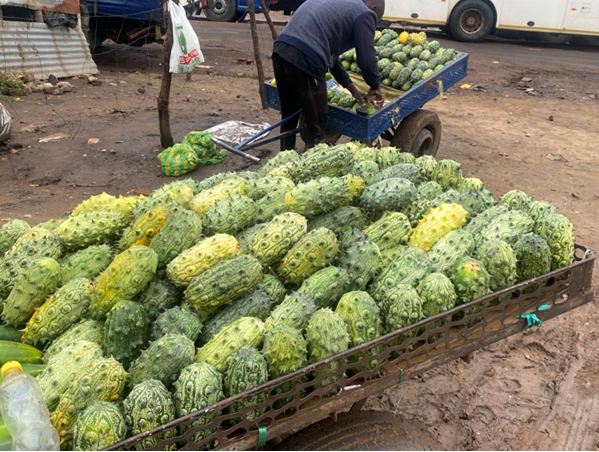Some of the most powerful instincts about African agriculture and food systems are found only in territorial mass markets where the majority of smallholder farmers sell their commodities and the majority of low-income consumers get their food. That is why investment in data analyses is more important than collecting data for its own sake. Much of the data collected by government extension agencies is not converted into business cases that can help farmers, traders or consumers. That means a lot of resources are wasted collecting information that is never used to positively change lives. In the absence of a consistent data collection culture, valuable market instincts that are not found in any agribusiness manual or textbook remain undocumented for decades.

Using market data to empower value chain actors
For more than a decade, eMKambo (www.emkambo.co.zw) has made it its mission to provide raw and processed market information for a wide range of farmers, consumers, traders, processors and policy makers. Such data range from basic daily price information to performance trends of particular commodities such as potatoes, tomatoes, banana, avocadoes, indigenous chickens, legumes and several value chains. There is no dedicated government department with officers who wake up daily to collect data from several markets. Policy makers rely on self-reported data from parastatals and private companies that handle less than 30 percent of agricultural commodities in most African countries. Consequently, any country that is not collecting data from territorial mass markets which handle more than 70 percent of agricultural commodities is missing the big picture of the economy.
The power of collecting data directly from ordinary people
While government statistical agencies and development agencies are still fond of conducting periodic surveys, the fast pace at which farmers and entrepreneurs need to make decisions implies data analyses has to be done quick enough to inform current decisions. Data supposed to inform seasonal agribusiness decisions like acquiring relevant food processing machinery will be useless if not provided in real-time. To address some of these knowledge gaps, digital technologies are now making it possible to collect data directly from many farmers, traders, transporters and consumers, most of whom now have smartphones. Enabling farmers and ordinary people to collect and share their own data is another way of empowering their own decision-making. For instance, eMKambo has noticed that farmers who share market information from their local communities and markets become more curious about what is happening in other markets.
Knowledge starts with curiosity which end up fuelling entrepreneurship skills. When household members are given simple tools for collecting and sharing data using their mobile phones, they become critical sources of data for understanding the conditions, experiences, and aspirations of diverse families and communities. They don’t have to wait for a national news crew to visit their local enterprise and gather news for broadcasting to the whole nation. Instead, they share knowledge in real time in ways that inform interventions by government departments and development agencies without spending money on consultants to conduct baseline studies. Resource allocation for important initiatives like market development and relevant infrastructure to monitor key issues like food safety can be made faster and more cost-effectively. That is also how data collection pathways give communities voices to influence policies and programs that affect their lives. For instance, they can guide the local member of parliament to use constituency development funds for aggregating local goats for the export market rather than building another local clinic when the community already has five health centres close to each other.
Benefits of bringing data collection capacities closer to communities
When communities are capacitated to collect data, local people are able to bring their experiences directly to decision-makers and influence health, education, women’s economic empowerment, disaster resilience, and many other interventions currently implemented from the top. Additional benefits include the following:
- Policy makers and investors consistently get new insights about the levels of vulnerability to poverty and unsafe food within communities and local markets. For instance, when farmers are able to share their production cycles including the kinds of chemicals used in horticulture, government can track pesticide residues in food commodities like tomatoes and leafy vegetables. Such intelligence can help in shaping public health campaigns around food safety, health and wellness, which, if not addressed can be a huge national security issue.
- A culture of data collection builds strong muscles and systems for collecting more data on diverse issues like number of women and youths employed by each agricultural value chain from production to markets. Eventually, such data muscle can be used to build interactive and inclusive platforms that advance gender equity, strengthen health systems, as well as improve the capacity of local authorities to monitor and evaluate their own service delivery performance .
- Demystifying data collection – Striking a good balance between quality, cost, and time in data collection can stimulate innovation, making data collection an affordable endeavour for local communities toward setting up their own community knowledge centres. When communities participate in data collection, they also inform the generation of innovative tools such as context-specific questionnaires that embed indigenous knowledge systems.
Once data collection becomes an integral part of a community’s culture, the quality, authenticity and relevance of local data improves so much that new investors coming into the community will have a reliable starting point. More importantly, the community becomes more interested in preserving the integrity of its data as a very important intangible asset. Reliable data can enable decision makers to generate a holistic perspective about the entire economy including critical issues such as social justice. When properly used, data can also build resilience by shaping critical interactions and public sentiment around African agriculture, climate change and food systems.
Charles@knowledgetransafrica.com / charles@emkambo.co.zw /
Website: www.emkambo.co.zw / www.knowledgetransafrica.com
Mobile: 0772 137 717/ 0774 430 309/0712737430
